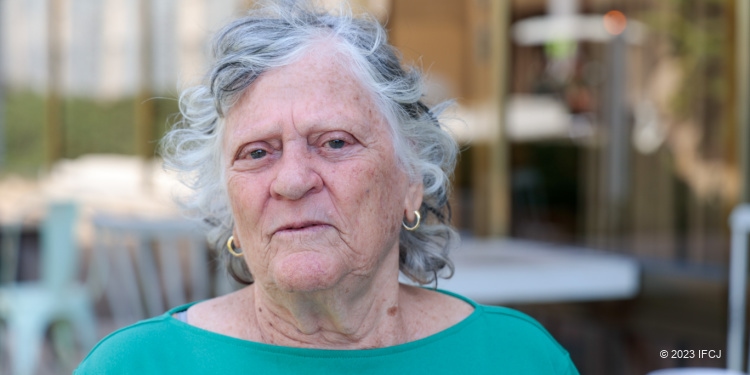Her Home Destroyed: ‘The Place I Loved Most’
The Fellowship | October 25, 2023

The Fellowship is on the ground providing help to Israel in her time of greatest need, and so we’ve talked with survivors of the October 7 attack to hear their stories… people like Batya.
Batya sat very still in her safe room, trying not to make a sound, as voices yelled outside the door.
She saw that her phone was almost out of battery, and, thinking only in that moment of her two daughters and eight grandchildren, she texted them: “I love you, don’t think about me, just do everything you can to save yourself and the children.”
It was October 7 and many of the kibbutzim near the Gaza Strip, including the one where Batya and her daughters live, were under a surprise attack by Hamas terrorists who had broken into Batya’s home and were now trying to break into her safe room.
And she tells us, “Time stopped. I understood that this was it…. I was not getting out of this room alive.”
In total, she would spend 32 hours alone without electricity, water, or food—all while not knowing if her family was safe—trapped until IDF soldiers rescued her.
Listening to the Terror Unfold
Originally from Morocco, Batya came to the Holy Land as a young girl. She’s built her entire life on the kibbutz where she and her late husband were founding members of the community. And she knows all too well the danger posed by the enemies that surround Israel, especially living in a border community. She’s lived through many tragedies, such as losing her oldest son, who was killed during his army service. Despite all this, she still tells us, “This is my home and the place I love the most in the world.”
But early in the morning on October 7, one of the biggest tragedies and terror attacks to face the community – and all of Israel – was about to happen. About 6:00 a.m., Batya heard the code red siren sound.
Hearing the siren was a shock, because usually there are warnings ahead of time before any military conflicts. Since Batya only has about 15 seconds to take shelter, there wasn’t enough time to charge her phone or grab water or food.
But the real shock is what happened next: soon after reaching her safe room, she heard terrorists in her home. They had broken in and she could hear a battle taking place outside. “The whole time I was thinking and worrying about my children and grandchildren,” she admits. “I prayed that they were still alive.”
Terrorists had infiltrated her community and were killing many, wounding others, committing brutal attacks, and even kidnapping people and taking them to Gaza.
Meanwhile, for hours Batya was fearing for her life, listening to every painful sound from the terrorists moving in her home. She admits: “At some point I wanted to open the door of the room so that the terrorists could kill me.” She hoped for an end to her suffering.
A Heroic Rescue
As she reflects on the moment that the IDF rescued her, she tells us that she feared the soldiers might be Hamas terrorists. “When I was in the safe room, I got a message from the kibbutz group that the terrorists are masquerading as IDF soldiers, and that is how they are convincing people to open their doors,” she says.
But they had a password to prove they were the real IDF, and so when the soldiers spoke this password to her, she felt relief wash over her.
The biggest feeling of relief was when she heard the voices of her two daughters for the first time. “They told me that they and the children were okay,” she says. But then came some bad news: “They told me that they lost contact with my sons-in-law and a few days later, we found out that they were killed in the battle with the terrorists.” The two men were in the emergency squad of the kibbutz and had gone out to protect the residents.
She says, “It is hard to say this, but I am relieved…. relieved that [they were] not kidnapped or tortured by those despicable terrorists. [They were] killed in battle like heroes.”
After being rescued from the kibbutz, Batya and her two daughters received immediate financial assistance from The Fellowship so that they could purchase basic needs.
“I don’t have anything. I left with just the clothes on my back,” said Batya. “I have no house to return to, and I think that I will never be able to return to my kibbutz, because the place I love so much has been destroyed.”
She adds: “The Fellowship was one of the first that provided us with significant assistance that will help us pick up the broken pieces and start over again.”
